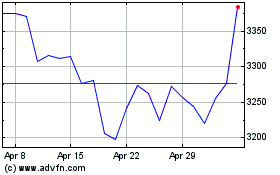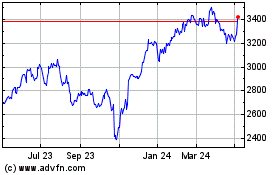Senators Rip Credit-Reporting Model in Wake of Equifax
October 04 2017 - 12:26PM
Dow Jones News
By AnnaMaria Andriotis
Senators questioning Equifax Inc.'s former chief Wednesday
attacked the business model of the credit-reporting industry,
asking why consumers shouldn't have power over the data that the
companies collect on them.
The hearing, one of a series this week, was as much about the
control consumers have over their personal data as it was about the
Equifax hack. Senators questioning former Equifax Chief Executive
Richard Smith asked whether a large overhaul is needed for both
private sector and government activities.
"Massive data collection is being undertaken across this
country," Banking Committee Chairman Sen. Michael Crapo (R., Id.)
said during Wednesday's hearing before his panel. He added that
Congress needs to take action with personal identification being
collected by government, the private sector and others.
In terms of the big credit-reporting companies -- which along
with Equifax include Experian PLC and TransUnion -- a key point
senators repeatedly raised was: Consumers don't choose to share
their data with these firms, but much of their financial lives,
including whether they can get approved for loans or rent an
apartment, depends on the data the companies have and then sell to
lenders and other companies.
Although Equifax has been the main focus of attention since
disclosing its massive breach in early September, the
credit-reporting industry has feared the breach will lead to more
regulatory oversight and changes to the underpinnings of the
consumer-finance economy.
Several senators called for just that. Sen. Sherrod Brown (D.,
Ohio) said consumers have more control over their personal medical
data and questioned why similar standards shouldn't be applied to
financial information.
Such comments raised questions about how the industry could be
changed, and whether doing so would make it more difficult or more
cumbersome for consumers to obtain credit. Consumers who don't have
credit reports often can't get approved for loans.
At the same time, consumers don't give their permission to have
their personal financial information collected, nor do they receive
any compensation for it. Rather, the credit-reporting companies
gather it and then sell it on to lenders.
The broader industry focus didn't spare Mr. Smith and Equifax
from another day of harsh criticism for missteps that allowed
hackers to access consumers' data and the handling of the breach
once it was disclosed. On Tuesday, Mr. Smith was similarly grilled
during an appearance before a House subcommittee.
The executive goes before another Senate panel Wednesday
afternoon and another House committee on Thursday.
Equifax's quest to acquire ever more data on consumers under Mr.
Smith's leadership came under attack. And further questions were
raised about just when Equifax became aware of the severity of the
breach and why Mr. Smith and other executives made public
presentations without acknowledging that something was amiss.
Mr. Smith, who repeatedly apologized for the hack, responded
that at those times, the company had yet to fully understand the
size or scope of the breach.
Write to AnnaMaria Andriotis at annamaria.andriotis@wsj.com
(END) Dow Jones Newswires
October 04, 2017 13:11 ET (17:11 GMT)
Copyright (c) 2017 Dow Jones & Company, Inc.
Experian (LSE:EXPN)
Historical Stock Chart
From Mar 2024 to Apr 2024

Experian (LSE:EXPN)
Historical Stock Chart
From Apr 2023 to Apr 2024
